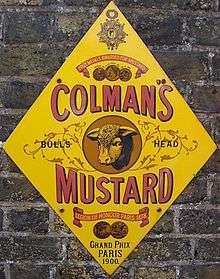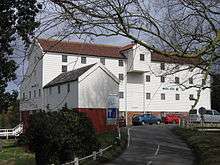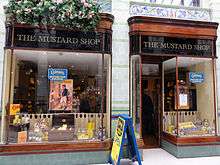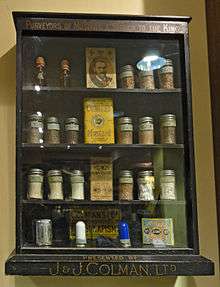Colman's
Colman's (est. in 1814) is an English manufacturer of mustard and other sauces, based at Carrow, in Norwich, Norfolk. Owned by Unilever since 1995, Colman's is one of the oldest existing food brands, famous for a limited range of products, almost all varieties of mustard.
 An old Colman's advert at the Buckinghamshire Railway Centre | |
| Product type | Mustard |
|---|---|
| Owner | Unilever |
| Country | Norfolk, East Anglia, England |
| Introduced | 1814 |
| Previous owners | Reckitt & Colman (now Reckitt Benckiser) |
History
In the early 1800s, Jeremiah Colman began making mustard at a water mill near Norwich in the village of Bawburgh. To create a tangy flavour, he blended brown mustard (Brassica juncea) with white mustard (Sinapis alba).

Jeremiah founded Colman's of Norwich in 1814, at the Stoke Holy Cross mill on the River Tas, four miles south of Norwich.[1] In 1823 he took his adopted nephew, James, into the business which became J. & J. Colman.[1]
In 1851 J.J. Colman took over the business.[1] By 1865 production had transferred to a large factory at Carrow Road on land at Thorpe Hamlet, bought from the Norfolk Railway to the south of Norwich,[1] where the firm still operates today.
From 1855 the firm introduced its distinctive yellow packaging and bull's head logo, and in 1866 was granted the Royal Warrant as manufacturers of mustard to Queen Victoria.[1] Her Majesty's household still uses Colman's today.
The Colman family's pioneering achievements in social welfare are part of Norwich's history. In 1857 a school was opened for the employees' children,[1] while in 1864 the firm employed a nurse to help sick members of staff—a social revolution at the time.[1]
From 1896 Sir Jeremiah Colman became chairman.[2] In 1903, the firm took over rival mustard maker Keen Robinson & Company,[1] through which it also acquired the Robinsons barley water and baby food business.[3] The purpose of the acquisition was to reduce competition within the mustard business.[3]
By 1909 the company employed 2,300 people.[3]
Keen's production was moved from London to Norwich in 1925.[3]
Together with Reckitt, the company acquired French's, the American mustard manufacturer, in 1926 for £750,000.[3]
In 1938 it merged with Reckitts and Sons of Hull to form the Reckitt & Colman household products conglomerate.[1]
From 1997 to 2001, Colman's were the main sponsors of Norwich City Football Club.
The Colman's part of the business was demerged in 1995 and Colman's became part of Unilever UK Ltd.[1][4] As well as mustard, it applies its name to condiments, sauces and other foodstuffs. Reckitt and Colman engaged in aggressive cost-cutting as it prepared to sell the brand, getting rid of the agronomy department, which had looked after plant breeding and seed development.[5]
Colman's maintains links with Norwich. The founding family are commemorated in street names such as Colman Road (part of the A140 inner ring road), on which is situated Colman's First and Middle Schools. In addition, the Colman House residence at the University of East Anglia is named after the company and Jeremiah Colman.
Closure
In January 2018, it was announced that Colman's was to leave its base in Norwich where the condiment has been produced for 160 years and would move its production to Burton-on-Trent and Germany.[6]
Colman's Mustard shop and museum


The Mustard Shop traded in Norwich from 1973 to April 2017.[7] The shop was originally opened in Bridewell Alley.[7] In 1999, the shop was relocated to Norwich's art nouveau Royal Arcade.[7] Norwich Heritage Economic & Regeneration Trust took over the shop in 2009, making it both a retail operation and tourism attraction.[7] In 2015, Guildhall Enterprises took the premises from HEART.[8] The shop was closed in April 2017.[7][8]
Publicity
In the 1920s Dorothy L. Sayers worked on their account and media slogans such as "Come on Colman's, light my fire" appeared in the late 20th century. Sayers was employed by S. H. Benson; her collaboration with artist John Gilroy resulted in "The Mustard Club" for Colman's Mustard.[9]
Product range (21st century)
- Colman's English Mustard 50g
- Colman's English Mustard 100g
- Colman's English Mustard 170g
- Colman's English Mustard Squeeze 150g
- Colman's French Mustard
- Colman's Hot Dog Mustard
- Colman's Mustard Powder
- Colman's Wholegrain mustard 150ml
- Colman's Dijon mustard 150ml
- Colman's Mild Mustard 300ml
- Colman's Condiments
- Brambly Apple Sauce - Classic Mint Sauce - Cranberry Sauce - Fresh Garden Mint - Horseradish Sauce - Seafood Sauce - Sweet Mint Jelly - Tartare Sauce
- Colman's Pour overs
- Colman's Dry Sauces
- Colman's Special Sauces
- Colman's Mustard Shop & Museum's Exclusive mustards[10]
See also
References
- "Colman's History". colmansmustardshop.com. 8 June 2009. Archived from the original on 8 June 2009. Retrieved 8 December 2018.
- "Department of Biochemistry: History". University of Cambridge. 2015. Archived from the original on 3 August 2009. Retrieved 8 December 2018.
- "The Emergence of Modern Marketing" (PDF). Archived from the original (PDF) on 9 August 2014. Retrieved 21 March 2015.
- "Colman's Norwich factory jobs may be at risk". BBC News. 25 June 2013. Retrieved 8 December 2018.
- "BBC Food – How English mustard almost lost its name". BBC Food. Retrieved 21 March 2015.
- "Colman's to leave Norwich base after 160 years". BBC News. Retrieved 4 January 2018.
- Knights, Emma (18 April 2017). "Colman's Mustard Shop to close and reopen in a new Norwich site later in the year". Eastern Daily Press. Retrieved 8 December 2018.
- Powell, Luke (6 October 2017). "Colman's artefacts put into storage as plans to re-open Norwich's famous Colman's Mustard Shop scrapped". Eastern Daily Press. Retrieved 8 December 2018.
- Barbara Reynolds. Dorothy L. Sayers: Her Life and Soul. NY: St Martin's Griffin, 1997. P. 164-165
- "Food & Drink, Our Exclusive Mustards". Mustardshopnorwich.co.uk. Retrieved 26 July 2011.
External links
| Wikimedia Commons has media related to Colman's (mustard). |